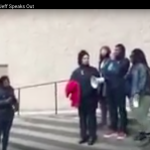The most recent occurrence of misconduct by the New Haven Police Department (NHPD) was at the annual St. Patrick’s Day parade. Following the parade, a police officer was videotaped slamming down Teandrea Cornelius, a 15-year-old Black girl, face first into the ground while she was already handcuffed.
The video of this incident has gone viral, and the New Haven community is livid. Barbara Fair, a New Haven resident and activist, has been leading protests since the incident. The demands of the protest were for the officer who attacked Cornelius to be fired and punished for his actions.
The protesters rallied on the steps of the Police Department at 1 Union Avenue and demanded that the Chief of the department come out and speak to us in front of the news cameras that were stationed there to document the demonstration. We got no answers.
After being laughed at by the officers inside of the building, Barbara Fair led everyone outside to block traffic in efforts to get a more adequate response from the officers.
People began losing direction and motivation, and what was initially a collective protest quickly became a collection of individuals who had no way to collectively target their anger and frustration. Eventually, a Lieutenant Officer approached the crowd and promised us that the investigation of the Officer who attacked Cornelius was underway.
I felt myself locked in a crowd of negativity and helplessness. Surrounding me were people who wanted answers, people who wanted to believe in the idea of justice that was promised to them by the department. Standing in front of them was a man who had all of the answers, but they just weren’t enough. People got discouraged and started to go home.
The Lieutenant Officer left and people began discussing a follow-up protest at City Hall the next day. It was agreed on that the protest would happen, but conflict about the organization and structure of the protest arose. One Black woman complained to Barbara Fair that the protest was horribly planned and that she could do a better job at organizing than her. They argued for a few minutes as I looked on, disappointed at how easily my people were falling apart.
On my way home I saw two police officers of color, one Black man and one Latina woman. I asked them what they thought of the protest.
“We love it when we see people exercising their rights and caring about what happens to the community!” the Black officer explained. The Latina woman nodded her head in agreement.
“But you know, this isn’t good for people,” I said to them. “People here are angry and upset and confused. They are not getting any feedback from you guys. If the department worked effectively, we would all feel safe in the hands of the law, and communicating with police officers would not have to be done by protest.”
The officers nodded their heads and looked apathetic. “You know, we just cannot meet your demands. There is a protocol in place for officers who are accused of committing police brutality. We can’t just take their jobs from them. Their jobs are protected under the law. It’s just like any other civilian with a job, you can’t just disallow someone from working when you don’t know that the accusations are true.”
“What about the fear that a video like this will incite community members? Can’t you guys suspend the officer temporarily to at least save face? Wouldn’t it be better for everyone if they felt as though the NHPD was serving their own best interests?”
The officers explained that the police officers have a right to their jobs, even if there are videos as disturbing as the one from the St. Patrick’s Day parade. When I admitted to them that I believe that they have too much power, I was met once again with apathy.
On the Friday of that week there was a counter-protest organized by the New Haven Police Department supporting the officer who was filmed slamming down Cornelius. The same group who protested with Barbara Fair went to the counter-protest in order to counter their counter-protest.
These protests are not productive because the protesters have demands that cannot be met by the NHPD.
by Karléh Wilson


